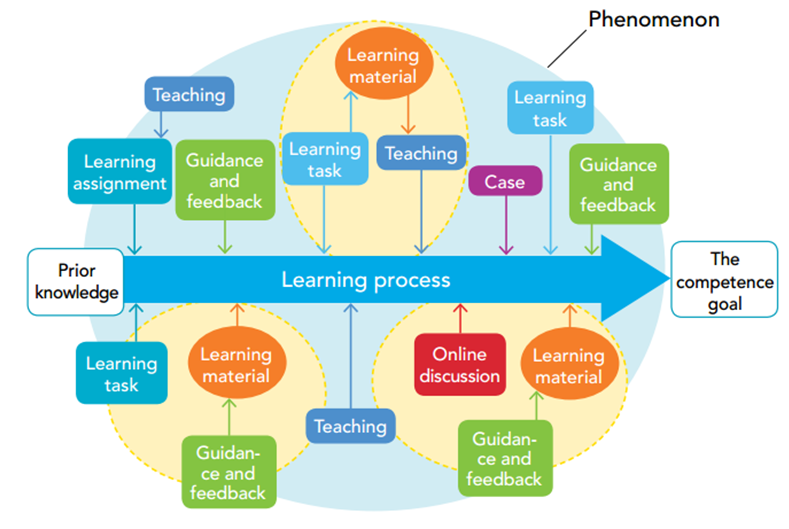|
Finland is moving away from traditional school subjects and on to something called 'phenomenon based learning'. In Phenomenon Based Learning (PhenoBL) and teaching, holistic real-world phenomena provide the starting point for learning. The phenomena are studied as complete entities, in their real context, and the information and skills related to them are studied by crossing the boundaries between subjects. Phenomena are holistic topics like human, European Union, media and technology, water or energy.The starting point differs from the traditional school culture divided into subjects, where the things studied are often split into relatively small, separate parts (decontextualisation).
Phenomenon-based structure in a curriculum also actively creates better opportunities for integrating different subjects and themes as well as the systematic use of pedagogically meaningful methods, such as inquiry learning, problem-based learning, project learning and portfolios. The phenomenon-based approach is also key in the versatile utilisation of different learning environments (e.g. in diversifying and enriching learning while using eLearning environments). In the diagram below (taken from http://livetheorganicdream.com/finland-abolishing-school-subjects/) the process is explained. Will this be the end of subjects, of 'knowledge' Govean style, and the start of an emphasis on process? And will it be the end of HE and traditional academia? And if so, does that matter? It'll be interesting to see how this will pan out in Finland over the years. There are a lot more women than men going to university this September/October - a third more youg women than young men so far, according to UCAS (http://www.bbc.co.uk/news/education-410669730).
The latest figures suggest that about 133,00 18-year-old women from the UK have secured a university place in the UK, compared with approximately 104,800 men of this age. The BBC suggests that across the UK, 27.3% of all young men are expected to go to university this year compared with 37.1% of women.This is a huge gap (36%) - and larger than last year's gap; it's also 5% more than the 2012 gender gap. UCAS has said that there is a 9% increase in UK 18-year-olds placed on nursing courses this year, so this will be a contributory factor; women significantly outnumber men for these degrees, with around 28 women recruited for every man. According to the BBC, Dr Mark Corver, who is UCAS's director of analysis and research, said: "More UK 18-year-olds will be starting university this autumn than ever before but large differences in who goes remain. "Our research has shown that the difference between 18-year-old men and women entering university is now similar to that between the richest and poorest halves of the population. "The statistics today show the difference between men and women slowly growing wider." We should always be wary of gender gaps; they often have their roots in schools, and in and they tend to be subject related - as we can see from the nursing figures, above. It is great, I hope, that more young women are entering HE - but what of the young men? Rumour has it that schools are putting an increased premium on apprenticeships, and these may be more attractive to young men. So is this the continuation of the deskilling of the workforce and of our developing a cohort of technicians (e.g. in education and nursing), as opposed to sentient professionals? It's been a quiet mnoth - sorry - but welcome back! While I've been away, GCSE and A level results have been published, and have been accompanied by the usual furore about education. Are teachers getting lazier? Are children not as 'bright' as they used to be? Should we be teaching to the test? Are examinations reliable and valid measures of anything? The answers to all these questions is 'no'. But in this post I'd like to think about the new grade 9-1 GCSE grades. The CGP website (https://www.cgpbooks.co.uk/gcse_grades_9_1_explained) suggests that GCSEs are 'tougher than ever'. This diagram is the really useful CGP explanation of the new grading system for Mathematics, English Langauge and English Literature. What the diagram shows very clearly is that there is a finer degree of grading and separation at the top - grades 5,6,7,8 and 9 equate to the old B, A and A*. And a grade 4, which sounds pretty mediocre (especially to those of us old enough to remember the old CSE 1-9 grades), is in fact equivalent to a GCSE pass at grade C.
Apparently over 2000 students got grades 9 in all 3 subjects - mostly from elite grammar schools, according to yesterday's Telegraph (http://www.telegraph.co.uk/education/2017/08/24/meet-students-defied-gcse-predictions-scoring-clean-sweep-grade/). Given that there were over 5 million examinations sat (a scarily high number), which is about half a million students (possibly even 600,000 - the exact figures are not yet available) - that 2000 isn't a very large proportion. So what does this tell us about inclusion, about the value of process, about students who are unlikely to get grades 6 to 9? Does it suggest that we put more emphasis than we used to on the importance of being 'gifted'? Are we moving back to the days of Cyril Burt? And is this 1-9 system just a precursor to the reintroduction of selective schools across the board? Is a 4, or what Justine Greening calls a 'standard pass' very different from a 'strong pass', a 5? There are, as always, 'more questions than answers'. But yet again, we are back to the fundamental question about the purpose of examinations and indeed of education in general. These are key discussions that I've addressed in this blog before - and we need to be asking them of the government and leaders in education. And finally, The Guardian has a great analysis that's worth looking at, it's at https://www.theguardian.com/education/2017/aug/24/proportion-of-students-getting-good-gcse-grades-falls-after-reforms |
About me...
I was a psychology and social sciences teacher for many years and now I am in the throes of a leadership, teaching and research career in HE. I care passionately about education. This blog will show you why and how.
Categories
All
Archives
March 2023
|






 RSS Feed
RSS Feed